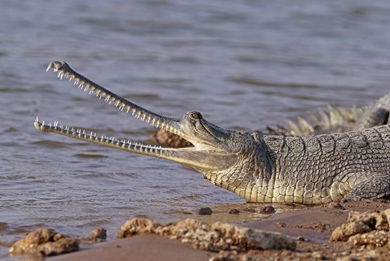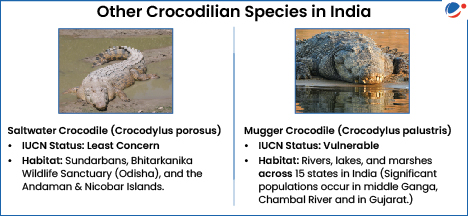This initiative reinforces the state’s leadership in gharial conservation, as MP hosts over 80% of India’s gharial population.
About Gharials (Gavialis gangeticus)

- Gharials are endemic (native to Indian subcontinent) long-snouted crocodiles.
- Name comes from 'ghara' (pot) due to the bulbous growth on the snouts. Only mature males have this bulb.
- Conservation status: - IUCN: Critically Endangered; Wildlife (Protection) Act, 1972: Schedule I; CITES: Appendix I.
- Habitat: Freshwater rivers with sandy banks.
- Historical Range: Indus, Ganga, Brahmaputra, and Mahanadi-Brahmani-Baitrani River systems across India, Bhutan, Bangladesh, Nepal, and Pakistan.
- Current Range: Primarily Chambal, Girwa (India), and Rapti-Naryani (Nepal) rivers and smaller populations in Ken, Yamuna, Brahmaputra, Ghaghara, and Bhagirathi-Hoogly rivers.
Threats:
- Habitat destruction due to agricultural and industrial expansion, along with plastic pollution.
- Entanglement and drowning in fishing equipment.
- Egg predation, illegal poaching for skin and meat, and use of body parts in medicine.
Conservation Efforts:
- Captive Breeding & Reintroduction: Breeding centres including the Deori Gharial Breeding Center (MP), Kukrail Rehabilitation Centre (Lucknow). Gandak River in Bihar is a successful breeding site for gharials.
- National Chambal Sanctuary: Largest gharial habitat.
- Project Crocodile was started in 1975.






